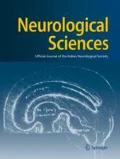Abstract
The condition of persistently high plasma CK levels is frequently encountered in asymptomatic patients with normal neurological examination. This condition may be the unique manifestation of several neuromuscular disorders, whose diagnosis is now possible using new diagnostic techniques. However, even if these patients are intensely investigated, specific diagnoses are not always forthcoming. Because of the lack of a widely accepted diagnostic protocol, hyperCKaemia in asymptomatic subjects is a potentially difficult clinical problem. In this paper we review the literature on conditions associated with variations in plasma CK levels and the literature on investigations carried out in asymptomatic persons with high CK to identify neuromuscular diseases. In the light of these data, and the deliberations of a working group of the Italian Association of Myology, we propose a diagnostic algorithm to guide the diagnostic work-up of persons presenting with persistently high levels of plasma CK. This algorithm has been discussed and approved by the Committee of the Italian Association of Myology.
Similar content being viewed by others
Author information
Authors and Affiliations
Corresponding author
Rights and permissions
About this article
Cite this article
Morandi, L., Angelini, C., Prelle, A. et al. High plasma creatine kinase: review of the literature and proposal for a diagnostic algorithm. Neurol Sci 27, 303–311 (2006). https://doi.org/10.1007/s10072-006-0701-0
Received:
Accepted:
Issue Date:
DOI: https://doi.org/10.1007/s10072-006-0701-0




